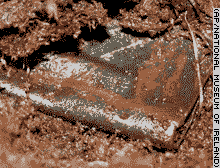
Psalm 102:16-18 (New International Version)
“For the LORD will rebuild Zion and appear in his glory.
He will respond to the prayer of the destitute; he will not despise their plea.
Let this be written for a future generation, that a people not yet created may praise the LORD”
I’ve never been fortunate enough to find a message in a bottle as I’ve walked along the seashore, nor have I ever found a long lost manuscript as I trekked these wonderful Flint Hills of Kansas. About as close as I’ve ever come to such treasure is picking up bits of sea glass along the dunes of Cape Ann, Massachusetts a couple of years ago. It occurred to me then that the messages they carried probably weren’t profound, just reminders of something discarded a generation or so ago, leftovers from a clam bake or a quiet seashore picnic perhaps. Ah, but they were messages of sorts, sent from one generation to another for deciphering. That, I think, is the important thing.
Sometime earlier this week CNN reported that an Irish construction worker came across a thousand year old manuscript, written in Latin, as he was working a backhoe in the thick mud of a Irish bog. The manuscript, which was turned over to archaeologists for further study, was on of those rare finds. Pat Wallace, director of the National Museum of Ireland, described it this way:
“This is really a miracle find.”
“There's two sets of odds that make this discovery really way out,” Wallace said. “First of all, it's unlikely that something this fragile could survive buried in a bog at all, and then for it to be unearthed and spotted before it was destroyed is incalculably more amazing.”
One of the things I found remarkable in the find, besides its historical value, was that it appeared to be sending a message from one generation to another. It was as though an Unseen Hand had planted this manuscript in just the right place so that it would be found at just the right time, with its message still intact.
What relevant message could a thousand year old manuscript carry from its time that would be relevant to ours? It couldn’t be much clearer. You see, the manuscript was found opened to Psalm 83:
Psalm 83 (King James Version)
“Keep not thou silence, O God: hold not thy peace, and be not still, O God.
For, lo, thine enemies make a tumult: and they that hate thee have lifted up the head.
They have taken crafty counsel against thy people, and consulted against thy hidden ones.
They have said, Come, and let us cut them off from being a nation; that the name of Israel may be no more in remembrance.
For they have consulted together with one consent: they are confederate against thee:
The tabernacles of Edom, and the Ishmaelites; of Moab, and the Hagarenes;
Gebal, and Ammon, and Amalek; the Philistines with the inhabitants of Tyre;
Assur also is joined with them: they have holpen the children of Lot. Selah.
Do unto them as unto the Midianites; as to Sisera, as to Jabin, at the brook of Kison: Which perished at Endor: they became as dung for the earth.
Make their nobles like Oreb, and like Zeeb: yea, all their princes as Zebah, and as Zalmunna:
Who said, Let us take to ourselves the houses of God in possession.
O my God, make them like a wheel; as the stubble before the wind.
As the fire burneth a wood, and as the flame setteth the mountains on fire;
So persecute them with thy tempest, and make them afraid with thy storm.
Fill their faces with shame; that they may seek thy name, O LORD.
Let them be confounded and troubled for ever; yea, let them be put to shame, and perish:
That men may know that thou, whose name alone is JEHOVAH, art the most high over all the earth.”
“Coincidence,” you say. “Uncanny,” I say. It’s as though a generation a thousand years past is shedding light into our present.
Holy writ declares that there are “many kinds of voices (languages) in the world, and none of them is without signification.” I believe there is signification for us today in this manuscript found in the Irish mud. Its message isn’t hidden. It’s very plain, very direct. The question is, will this generation heed it?
Technorati tags for this post:
Israel
News
Religion
2 comments:
Phil, The Psalter wasn't that of the King James version but the Vulgate which was popular at that time. Its numbering is different. The Psalm you quote is 84 in the Vulgate, and the Psalm that was partly visible - Psalm 83 in the Vulgate - concerns the 'Vale of Tears' not Israel. It is Psalm 82 in the King James numbering.
I posted on this misunderstanding and the National Museum of Ireland's clarification yesterday
It is nothing short of miraculous that God brings His Word to the forefront of our lives with authentication just as he allowed His Word to survive for thousands of years.
Post a Comment